Positions & Papers
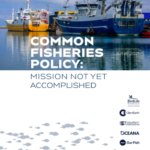
Common Fisheries Policy: Mission not yet accomplished
June 11, 2021
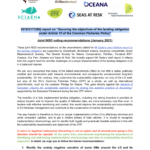
Joint NGO EU Parliament voting recommendations (January 2021)
February 10, 2021

Joint NGO recommendations on the setting of Northeast Atlantic fishing opportunities 2021
October 30, 2020
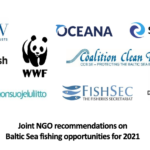
Joint NGO recommendations on Baltic Sea fishing opportunities for 2021
June 9, 2020
In October 2020, EU fisheries ministers will agree on fishing opportunities in the Baltic Sea for 2021. We have provided a range of recommendations regarding the principles for setting sustainable fishing quotas in line with the Common Fisheries Policy and also specific recommendations for the Total Allowable Catches for each of the Baltic fish stocks that are managed by quota. Read the NGO briefing here.
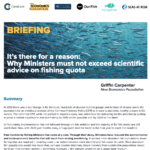
It’s there for a reason: Why Ministers must not exceed scientific advice on fishing quota
November 25, 2019
In a briefing by Griffin Carpenter of the New Economics Foundation the reasons and benefits for Ministers not exceeding scientific advice are laid out and provide a timely reminder ahead of the December Council meeting at which quotas for the Northeast Atlantic and North Sea will be set.
The message is clear: “Past inaction by fishing Ministers has come at a cost. Through their delay, Ministers have reduced the environmental and socio-economic benefits that will result from ending overfishing.” The briefing highlights one of the key commitments from the reformed EU Common Fisheries Policy (CFP) from 2013, an end to overfishing “by 2015 where possible and, on a progressive, incremental basis at the latest by 2020 for all stocks”. We have now reached the deadline set in the reformed CFP to end overfishing but with four out of ten stocks still being overfished in the Northeast Atlantic and nine out of ten in the Mediterranean and Black Sea, celebration for the EU commitment, it seems, was premature. The Council of Ministers which has the ultimate say in setting fishing quota has exceeded scientific advice in every six out of ten cases since the CFP reform. With the upcoming quota negotiations for 2020, this practice must end for the CFP objective to be met. The briefing provides detail on the environmental benefits of ending overfishing, a greater abundance of marine life in a more resilient ecosystem. Moreover, the socio-economic benefits of ending overfishing are explained, more catches and fewer trips. In addition, the cumulative profits generated from sustainable management and the quota implications for a wide range of stocks are expanded upon.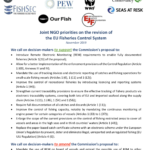
Joint NGO priorities on the revision of the EU Fisheries Control System
November 14, 2019
A broad coalition of NGOs have together drawn up a series of recommendations based on the EU Commission proposal for the revision of the Fisheries Control System, this includes both an analysis of the proposal as well as a detailed 12 point plan for reform.
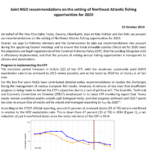
EU Fisheries Council 16-17 December. Northeast Atlantic fishing opportunities for 2020 – Joint NGO recommendations
October 24, 2019
In our joint recommendations to the EU Fisheries Council, The Fisheries Secretariat along with The Pew Charitable Trusts, Seas At Risk, Oceana, ClientEarth, and Our Fish have provided concrete policy proposals ahead of the December Council at which fishing limits or TACs will be set for over 100 stocks in the North Sea and Northeast Atlantic.
The MSY obligation, all stocks managed with a sustainable fishing mortality (under Fmsy) in order to achieve a sustainable biomass (Bmsy) by 2020, is due to be fully implemented at this Council meeting. However, there is serious threat of the legal requirement not being met. We provide an overview of "progress in implementing the CFP", referencing the EU body, the Scientific, Technical and Economic Committee on Fisheries (STECF), which clearly show that implementing of sustainable fishing limits has slowed in recent years. Further, we provide recommendations for setting TACs in line with the CFP requirements, the implementation of the Landing Obligation, and improving the transparency and accountability of the TAC setting process, in line with the EU Ombudsman investigation into the Council. Finally, we reference the Intergovernmental Panel on Climate Change (IPCC) Special Report on the Ocean and Cryosphere in a Changing Climate (SROCC), which predicts severe declines in European fisheries production and highlights the need to alleviate all other stressors on ocean ecosystems, specifically, ending overfishing to help restore fish populations and increase ocean resilience. "In light of this clear call to climate action, all fishing limits should at the very least not exceed the best available scientific advice and preferably be even more precautionary in light of diverse threats and uncertainty."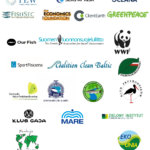
Letter to Baltic Ministers on Council TAC deliberations for 2020
October 10, 2019
Over 80 NGOs have written to ministers ahead of the October fisheries council meeting at which fishing limits will be set for next year. The letter states that "We welcome the progress that has been made in increasing the number of catch limits set in line with scientific advice. Nevertheless, we remain very concerned that, according to the latest report from the EU’s Scientific, Technical and Economic Committee for Fisheries (STECF), more than 40%of the North-East Atlantic stocks are still subject to overfishing. Furthermore, we note with serious concern that the rate of progress toward meeting the requirement to end overfishing has slowed in the last few years, making additional and urgent efforts necessary to restore stocks to healthy levels." In addition, "we would welcome an unequivocal commitment from you that you will do your utmost to meet the Article 2(2) requirements of the CFP...We urge you to strongly and openly oppose recommendations that do not follow the scientific advice of the International Council for the Exploration of the Sea (ICES) and the CFP Article 2(2) objective."
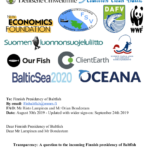
Transparency: A question to the incoming Finnish presidency of Baltfish
October 2, 2019
In a letter to the incoming Finnish presidency of Baltfish, 15 organisations have called for improvements to transparency and access to documents and positions taken by member states. "Transparency has been part of the work programme and agenda during the previous Swedish, Danish, German and Polish Presidencies and a successful outcome has yet to be reached. We call on the Finnish Presidency to end this long running saga and fulfil the transparency requirements of the European Union." These 15 organisations comprise a broad coalition of environmental organisations, segments of the fishing industry, as well as organisations representing anglers and recreational fishermen.
- Draft texts being proposed;
- Positions taken by national members;
- Meeting notes or minutes;
- And for all documents to be publicly available online."
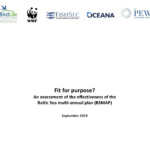
An assessment of the effectiveness of the Baltic Sea MAP
September 24, 2019
Fit for purpose? An assessment of the effectiveness of the BSMAP is a joint analysis of the Baltic Sea Multiannual Management Plan (BSMAP) by Pew Charitable Trusts, Birdlife International, WWF, FishSec and Oceana. We conclude that the BSMAP has failed to improve fisheries management in the Baltic Sea. The state of the Baltic ecosystem and its fish stocks speaks for itself. In place since July 2016, the BSMAP, was the first management plan adopted by the EU after the reform of the Common Fisheries Policy in 2013. Having been in place for three years it is being evaluated by the European Commission and has had a stakeholder consultation. We conclude that the BSMAP has failed to improve fisheries management in the Baltic Sea and recommend that MAPs and the CFP definine a maximum level of fishing mortality in future. The state of the Baltic ecosystem, its fish stocks and the decision-making process speaks for itself.
- MAPs were introduced in the CFP to address three specific challenges: the need for longer-term (multiannual) management geared towards achieving the CFP’s objectives; the need to take into account regional and ecosystem specificities; and the desire to bring decision-making closer to the regions in question.
- The Baltic MAP was instrumentalised to serve other purposes, key among which was the facilitation of the implementation of the LO and providing decision-makers with flexibility regarding fisheries management – not only in the Baltic region, but first and foremost in other European seas.
- The flawed design of the Baltic MAP led to management decisions and fishing practices that have failed to fulfill the intent of the CFP and achieve the MSFD’s Good Environmental Status target. The intended regionalisation elements have failed to ensure the MAP delivers on the specific needs of the Baltic in a timely manner, and lastly the MAP has failed to help deliver TACs in line with MSY and scientific advice.